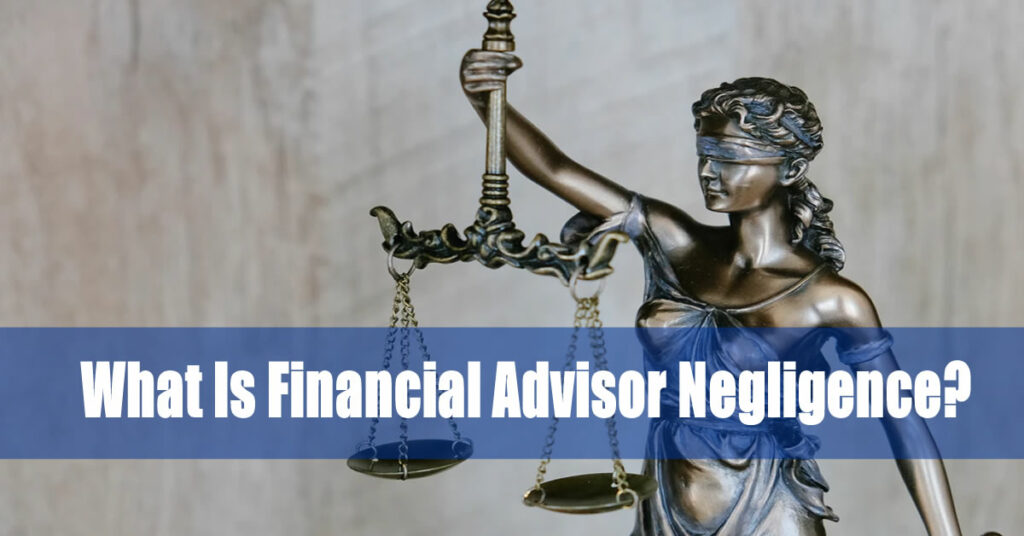A financial advisor is in charge of making decisions for a client and should take the right steps. He should also be aware of his obligations and duties, such as the duty of care, good faith, and suitability. If he fails to fulfill any of his obligations, it may be grounds for negligence.
Finances are a major part of our daily lives. Every aspect of our lives requires finances. Whether you are creating a monthly budget, looking to invest your money, running a business, planning for a vacation, or pretty much everything else, money must be involved.
It could get tricky and overwhelming, especially when big money is involved. That is why a financial advisor is crucial to money-making decisions in businesses and investments. Even so, you must be extra cautious about who you work with to avoid cases of financial advisor negligence.
Haselkorn & Thibaut’s experienced lawyers represent investors nationwide and have a 98% success rate. Investors can reach us online or by calling toll-free at 1-800-856-3352 for a free confidential consultation.
Role of Financial Advisors and Brokerage Firms
Table of Contents

A financial advisor is an expert or professional in all aspects of money, particularly business, and investments. The main job of an advisor is to talk with you and advise you on how to invest your money in the best way.
They should be able to listen to and assess your goals and suggest the best investment options. They should also help you figure out your savings, insurance, taxes, and the best way to prepare for retirement.
What is Financial Advisor Negligence?
When a financial advisor fails to do all of the above, that is termed “financial advisor negligence.” It might tell clients to invest in high-risk schemes, pensions that aren’t right for them, or ways to avoid paying taxes that aren’t right for them.
Any schemes not accepted by the law that put the clients’ finances at high risk or breach contractual duties could be pursued as financial advisor misconduct or negligence.
Types of Financial Advisor Negligence Claims
Financial advisor negligence happens when you receive unsuitable financial advice from an advisor. Some of the most common types of financial advisor negligence are:
- Auditing errors
- Missing tax filing returns
- Selling unsuitable products
- Accounting errors
- Understating the risk of an investment
- Incorrect tax advice
Stockbrokers and advisors have a lot of training and knowledge, so they should be more careful about doing something like this. The good thing is that once you know that you have a financial advisor claim, you can easily find assistance and take legal steps against your financial advisor.
When can you sue your financial advisor?

There are times when financial advisors and brokers need to do their jobs as expected. So, they could be held responsible for the investments their clients lose money on. Here are a few instances when you can sue your broker or financial advisor.
Breach of fiduciary duty
When a brokerage firm or investment advisor breaches their fiduciary duty, you may have the right to sue them for damages. A breach of fiduciary duty can be based on different sources, such as state common law or the Securities and Exchange Commission’s new Regulation Best Interest (Reg. BI).
A financial advisor breaks their fiduciary duty when they don’t act in their client’s best interest, don’t do their job with the most professionalism, care, and skill, or put their interests ahead of their client. If this happens, you may have the right to sue your financial advisor and receive compensation for your losses.
Unauthorized trading
If a financial adviser makes an unsuitable investment without your approval, you may suffer investment losses. In such cases, the adviser must be held accountable for any losses that you incur. If the adviser does not have the proper authorization to make trades on your behalf, then you may be entitled to compensation for the money you have lost.
Unauthorized trading is a serious violation of financial regulations and should not be tolerated. It is important to take legal action to seek compensation for your losses if you believe your financial adviser has acted without your authorization. This can help you reclaim any money taken from you due to unauthorized trading.
Material omission or misrepresentation
Financial advisers and other financial professionals have a duty to provide full disclosure of all relevant information when recommending investments. If they fail to do so, or if they intentionally omit or misrepresent any material facts, investors may lose money as a result of investment fraud. When financial advisers or other professionals engage in such activities, they are committing financial fraud. Investors who have suffered losses due to material omissions or misrepresentations should seek legal advice to determine if they can seek compensation for their losses.
Inappropriate investments
Investors who have lost money due to unsuitable investments often need the guidance of an experienced investment fraud attorney. Investment advisors and brokers should always make investments that align with the client’s investment objectives, risk tolerance, tax status, and other factors. If investors lose money due to inappropriate investments made by their broker or financial advisor, they should contact an investment fraud attorney to help them pursue compensation.
An experienced attorney will have the knowledge and resources necessary to help investors recover their losses and ensure justice is served. It is important to act quickly in these cases, as the clock may be ticking on any potential legal action. The sooner an investor contacts a qualified attorney, the better their chances are of recovering their losses.
Churning
Churning is an unethical practice undertaken by brokers and financial advisors to generate commissions rather than investment gains. It involves excessive trading, often with the customer’s account, in order to increase commission amounts. If you have been a victim of churning, it is important to understand your rights. You can take legal action against the broker or financial advisor and may be able to receive compensation for any losses you have incurred.
Lack of diversification
When an investor has a portfolio that is heavily concentrated in a single security or type of security, they face higher levels of risk. A diversified portfolio is less likely to swing wildly in value during times of market volatility, and a broker or financial advisor has a responsibility to discuss the risks associated with a lack of diversification with their clients. By not properly diversifying investments, investors risk losing money, and the broker or advisor may be held liable.
What to do when you have lost money
If your financial advisor fails to fulfill their duties and financial loss is suffered, you have a right to submit a claim and court proceedings at that. You can prove that there has been financial negligence if;
- There is a breach of contractual terms
- Breach of statutory duties
- Breach of fiduciary duties
For the complaint to be eligible, you must establish and prove that there has been a breach of that specific duty and show how exactly the financial professional did not comply with the terms of the contract.
Typically, negligence will be established where the professional has committed an error that no reasonable professional of his caliber could commit and, as a result, cost the client his reputation and a significant amount of money.
Keep in mind that there is a limit to professional negligence litigation. The case has been ongoing for six years. This period can be extended up to 3 years if the claimant only discovers the effects of the damage later after the six years have passed.
What Happens if it is Established that There is a Potential Negligence
Here is a brief explanation of what will happen if it is established that there was professional negligence;
Comply with the Provision of the Pre-action Protocol for Professional Negligence
If you have strong grounds for your claim, you must follow the pre-action protocol for professional negligence procedures. It outlines what you should do before the issuance of court proceedings.
The goal here is to achieve an early settlement without needing the court. All you have to do is send a letter of claim and wait for acknowledgment and a letter of response.
The Letter of Claim
You send this letter following the Pre-Action Protocol for Professional Negligence to submit your claims if you can’t reach an early settlement and need to proceed to court.
The letter should highlight all the facts, dates, allegations of negligence, and an estimation of the financial loss suffered. You should also attach any other documents that support your claims.
The Letter of Acknowledgement
This is the response to the financial advisor’s or his lawyer’s letter of claim. The protocol states that it should be issued 21 days after the letter of claim.
The Letter of Response
According to the protocol, the financial advisor has exactly three months from the date on the Letter of Acknowledgement to investigate and issue a letter of response or a letter of settlement, responding to your letter of claim.
Choosing a Financial Advisor Negligence Law firm

As soon as you find out you have a financial advisor claim, you will need help with the next steps. That is where a professional negligence lawyer comes in. These professional individuals help you seek the compensation you deserve after experiencing legal negligence.
Here is how to find a credible and trustworthy negligence lawyer;
Doing your Research
If you are doing this for the first time, finding a good lawyer who will help you get what you want is hard. You probably need to figure out where to start, who to ask, and how to identify one. Here are some tips;
- Check online. These days, everything you need is right on your phone. And that includes your best lawyer. All you need to do is type and search “layer near me.” Google will provide an overwhelming list.
- Go through the first couple of results, read their reviews, check their qualifications, and arrange an appointment for a short chat to further asses their experience and professionalism.
- Talk with different firms and professionals to gauge who best suits your needs in terms of experience, qualifications, and rates.
The Type of Law Firm
Usually, negligence lawyers work exclusively for either defendants or claimants. It is rare to find a lawyer who can work for both parties, mainly due to a conflict of interests. Those who work for claimants are more likely to be on the side of the victims than the defaulters of professional negligence.
Experience
Professional negligence claims could be complex. Experience is, therefore, one of the most important factors when choosing a lawyer to represent you.
The task here is to ascertain these professionals’ true experience before making a choice. Make sure to clarify the specific lawyer of your case with the firm. The last thing you want is to find out if the person you end up working for differs from the person you first spoke to.
Locations
Most people overlook the importance of physical location. While modern technology dictates that geography has become less relevant, it is still wiser for you to choose and work with a local lawyer.
“Local” could refer to your region or hometown. Or city. Whatever the case, it is important to be within physical reach. This makes it easier to attend meetings if need be. It may also be important that the lawyer is well acquainted with the local judiciary.
Rates
Knowing that you can afford their rates is also an important factor to look at. Rather, you may also consider if their rates are reasonable. Most of them calculate their rate with time, so in comparison, find out different hourly rates for different lawyers and choose one that works well for you.
Keep in mind that rates also vary depending on different factors. Lawyers who have been in the industry for a long time and are more experienced would definitely charge more than those who haven’t been in the industry for as long.
The same goes for those who have specialized in certain sectors. Another factor that may influence rates is location. Those in primary legal may charge a higher fee than those in secondary towns and cities.
Conclusion
An experienced, trustworthy, and professional financial advisor is a great asset. They make sure that your businesses, investments, savings, taxes, and other financial matters, as well as your overall financial goals, are in order. Their primary function is to ensure that your money is being used to increase your wealth.
Unfortunately, anyone is susceptible to financial advisor negligence. If this happens to you and you file a complaint, choose a reliable negligence lawyer to represent you and make sure you get the compensation you deserve.
Haselkorn & Thibaut’s experienced lawyers represent investors nationwide and have a 98% success rate. Investors can reach us online or by calling toll-free at 1-800-856-3352 for a free confidential consultation.


